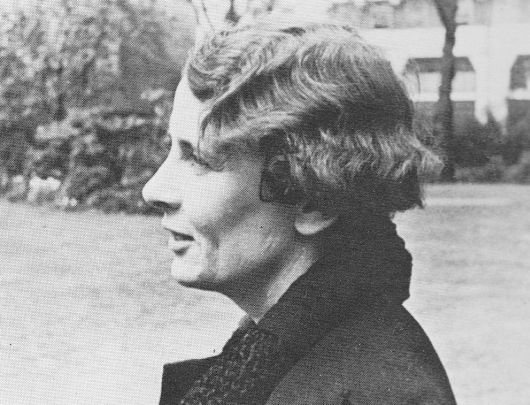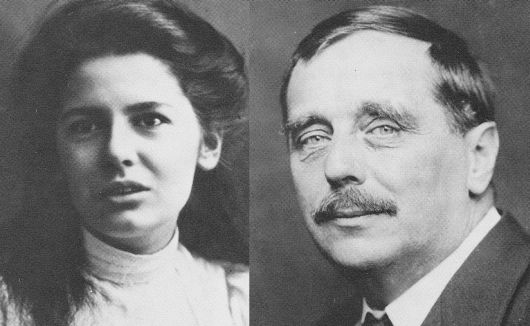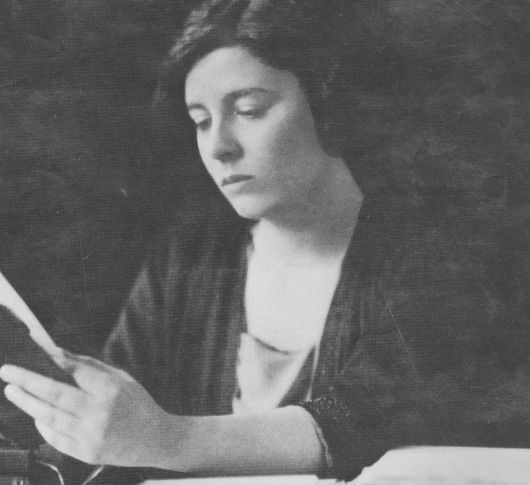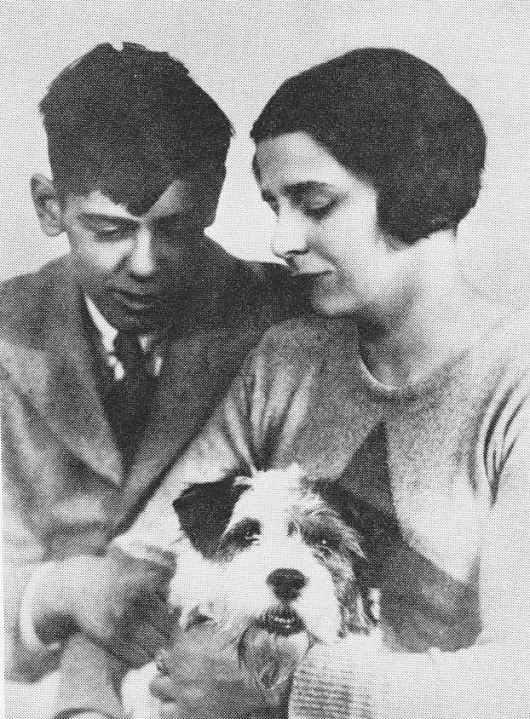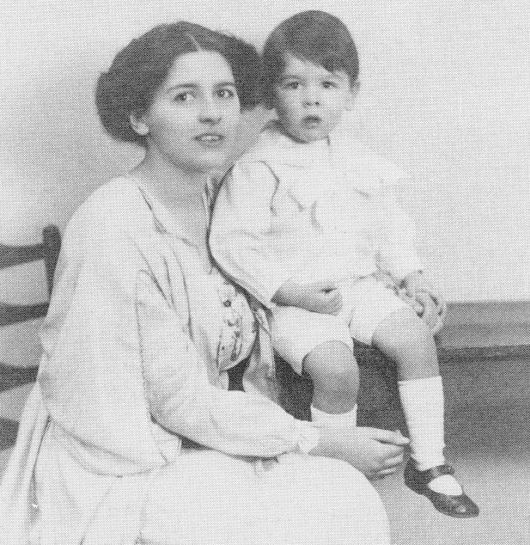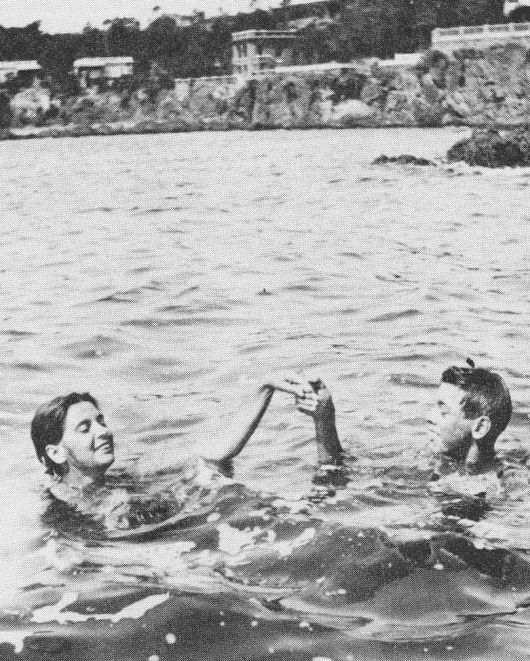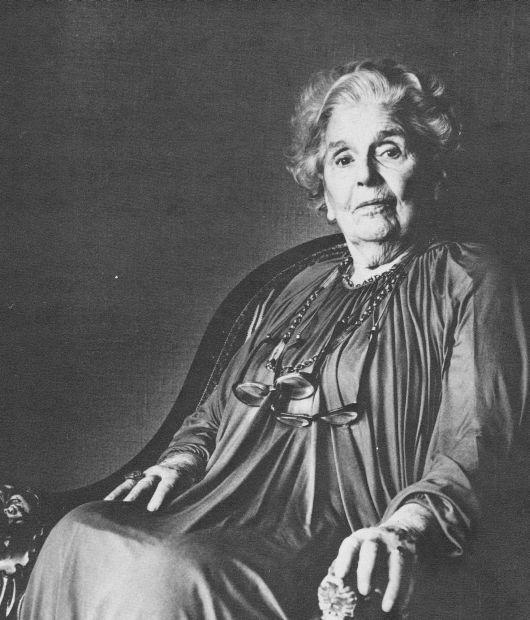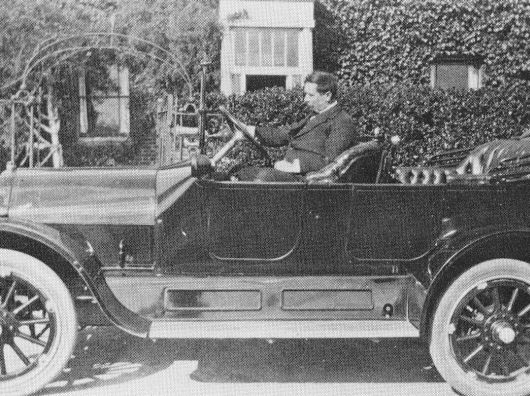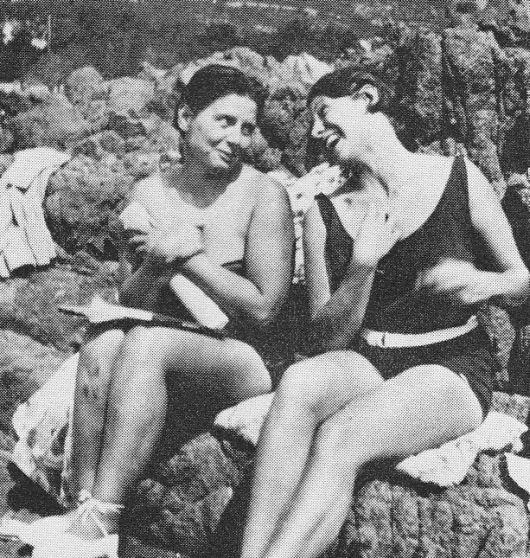 BOOKS
BOOKS In Which Rebecca West Flees To America
 Friday, February 24, 2017 at 11:10AM
Friday, February 24, 2017 at 11:10AM 
Midnight Blue
Rebecca West had a child with H.G. Wells named Anthony, and for a brief second, everything was fine. Then this repulsive, married man showed his true colors. Eventually West fled to America, writing the whole time. The following letters show how difficult it was for her to obtain what was she and her son were owed, and how brave she was for breaking free of him. The process of extricating herself from this abusive and deceptive person took several twists and turns.
Dear H. G.,
During the next few days I shall either put a bullet through my head or commit something more shattering to myself than death. At any rate I shall be quite a different person. I refuse to be cheated out of my deathbed scene.
I don’t understand why you wanted me three months ago and don’t want me now. I wish I knew why that were so. It’s something I can’t understand, something I despise. And the worst of it is that if I despise you I rage because you stand between me and peace. Of course you’re quite right. I haven’t anything to give you. You have only a passion for excitement and for comfort. You don’t want any more excitement and I do not give people comfort. I never nurse them except when they’re very ill. I carry this to excess. On reflection I can imagine that the occasion on which my mother found me most helpful to live with was when I helped her out of a burning house.
I always knew that you would hurt me to death some day, but I hoped to choose the time and place. You’ve always been unconsciously hostile to me and I have tried to conciliate you by hacking away at my love for you, cutting it down to the little thing that was the most you wanted. I am always at a loss when I meet hostility, because I can love and I can do practically nothing else. I was the wrong sort of person for you to have to do with. You want a world of people falling over each other like puppies, people to quarrel and play with, people who rage and ache instead of people who burn. You can’t conceive a person resenting the humiliation of an emotional failure so much that they twice tried to kill themselves: that seems silly to you. I can’t conceive of a person who runs about lighting bonfires and yet nourishes a dislike of flame: that seems silly to me.
You’ve literally ruined me. I’m burned down to my foundations. I may build myself again or I may not. You say obsessions are curable. But people like me who swing themselves from one passion to another, and if they miss smash down somewhere where there aren’t any passions at all but only bare boards and sawdust. You have done for me utterly. You know it. That’s why you are trying to persuade yourself that I am a coarse, sprawling, boneless creature, and so it doesn’t matter. When you said, “You’ve been talking unwisely, Rebecca,” you said it with a certain brightness: you felt that you had really caught me at it. I don’t think you’re right about this. But I know you will derive immense satisfaction from thinking of me as an unbalanced young female who flopped about in your drawing-room in an unnecessary heart-attack.
That is a subtle flattery. But I hate you when you try to cheapen me to myself, the things I did honestly and cleanly. You did it once before when you wrote to me of “your—much more precious than you imagine it to be—self.” That suggests that I projected a weekend at the Brighton Metropole with Horatio Bottomley. Whereas I had written to say that I loved you. You did it again on Friday when you said that what I wanted was some decent fun and that my mind had been, not exactly corrupted, but excited, by people who talked in an ugly way about things that are really beautiful. That was a vile thing to say. You once found my willingness to love you a beautiful and courageous thing. I still think it was. Your spinsterishness makes you feel that a woman desperately and hopelessly in love with a man is an indecent.
Rebecca West

To H.G. Wells
Dearest Jaguar,
I hate being separated from my Jaguar. Do you realise you were away from me for a month and that I have only seen you twice since? I hate it. I am going up on Monday to see about that studio. There is no life for us separately. Just a few nice hours over our books and articles and then when we can’t write any longer an empty feeling.
Your loving Panther

To Ottoline Morrell
Dear Lady Ottoline,
Thank you so much for the diary. Its blue watered silk is a special joy to me as I hate leather anywhere except on my feet. I hope you had a pleasant Christmas. I am feeling rather uninterested in New Year's, as I feel so doubtful of having one of my own, as I am going over to Paris by air tomorrow. If I arrive there whole I am going to leave flowers for Katherine Mansfield, who is out at Fontainebleau and (I hear) very very much worse. I shall be back about the 10th — do let me know if you’re in town. I lunched the other day with Mary Somerville who talked much of you. I think she’s so picturesque — like the youth of a Raeburn old lady. With best wishes for the New Year.
Yours very sincerely,
Rebecca West

To Sally Melville
Dear Sally,
I am as miserable as Hell. I have gone back to H. G. I am going down to the country with him this evening. What else can I do? He says that if I go back to him he will leave Anthony as much money as his other boys—that will mean about £20,000. I daren’t gamble on making that myself because I feel dead beat—and though I might marry I could never get any man to give Anthony £20,000. So there it all is. I could cry when I think of how I’d planned to go to Italy alone — I’ve never been alone in my life. I am sick of it all. I could have made H. G. get divorced and marry me — he wanted so much to get me back, but I thought it wiser not to. I don’t want Lettie to know of this. I’ll have to tell her later but not now.
Yours,
Rebecca

To Sally Melville
Dear Sally,
Alas! I couldn’t see a soul. H. G. has been giving me an awful time lately, firstly by absolute dependence on me — Then a fortnight ago he began to realize I really was going — then he got horrid — tiresome and jealous and quarrelsome—and never left me alone an instant — Then this last week he got very affectionate — he really is very fond of me — but still was dreadfully jealous — and wouldn’t let me see a soul—man or woman. It’s rather trying — and I’ve had no time to do my lectures — no energy pray Heaven I’m not sick on the boat for I shall have to do them there—and I feel so dog tired.
I don’t know when I shall be back. My dear, I’ve often thought of giving you the enclosed — it’s what Violet Trefusis gave me and is fairly good (very old, I believe) I’ve often thought it would suit your style. Take it, dear S. M, as a token of my very great affection for you.
My best wishes to both you and J. B. It’s midnight and H. G. has just gone and I’ve still to go over my papers!
Yours wildly,
Rebecca

To Bertrand Russell
Dear Mr. Russell,
I cut off from England in a state of such despair that I couldn’t see anybody. Otherwise I had very much wanted to see you and tell you about a problem that has vexed me very much. Now other circumstances have turned up, and although I’m still too stupid to tell you about things I’m driven to write to you about it after all.
May I tell you the story of my life? I’m afraid it amounts almost to that.
I left H. G. in 1923 when Anthony was nine years old, for various good and sufficient reasons. He demanded from me rather more than a husband usually demands in the way of continual help and care, he would give me only the barest amount of money, he prevented me from doing much work and the money I earned, such as I could do, he insisted on my spending immediately on the household expenses, he was extremely bad-tempered and cruel in case of illness or any difficulty arising out of our illegal relationship, and, above all, he was jealous and hostile to my son. He grudged every penny he spent on him, and even objected to my spending my own earnings on him. He was furious if I devoted any time to the child, and he loved exposing the child to strangers by advertising that he was his illegitimate child. This is to give you only the bare outlines of the relationship. The details would persuade you that I was compelled to leave him out of consideration for Anthony.
I had several times tried to leave him before but I never succeeded till I went to America for six months. During my absence he caused ghastly trouble by going to Anthony’s school and parading his parenthood before the other children so that some of them tormented the child about it. But when I came back things went along fairly indifferently until last year.
Last year H. G. took a violent loathing to me. I don’t know why. He hadn’t seen me for several months. Just about this time Anthony fell dangerously ill with a novel form of pneumonia which was at first mistaken for TB. H. G. came to see him when he was most dangerously ill, but left for the Continent and sent no word of enquiry for five weeks. At the end of that time I wrote and told him that Anthony was better and got a curt letter of acknowledgment. During the six months Anthony was in the sanatorium he visited him once, for about an hour. He made no move to pay the expenses of the illness, which amounted to over £300, until I sent him a bill for £30 and told him that he had got to pay it because I had no more money. He paid that bill but offered no further assistance. (I had better explain that my sole private income derived from H. G. amounts to less that £300 a year.)
During the autumn I was more and more conscious of an insane antagonism, which came to a head at Christmas. Gyp and Marjorie Wells asked Anthony down to Easton, either for Christmas or a later weekend. As we had made our Christmas plans I accepted the alternative and received innumerable insane letters abusing me for keeping Anthony with me for Christmas. He also refused to pay Anthony’s school fees for Stowe unless he was described at school as H. G. Wells’ illegitimate son. I was pursued by letters so insulting and accusing me of such unheard of offences — such as having wasted enormous sums of money he had given me and having prevented him from seeing Anthony (he has never in his life seen Anthony except at my suggestion) that I went to Charles Russell and said that he must carry on all communications for me.
It happened that Russell advised me to adopt Anthony legally to save death duties and save him various minor inconveniences. This I did. It should have cost me about £50. H. G. turned up and opposed it. And what alarms me is that he instructed his counsel to bring forward all these stories about me—which shows that he believes them. I was of course able to produce all his letters showing that he had never been denied access to Anthony, so it didn’t matter. Also he assured the court that I was an unsuitable person to bring up Anthony, and exposed him to the society of persons who were not respectable.
This did not impress the court — but what did was that the £8,000 he has settled on Anthony (which is mostly tied up till he is 21) are all the subject of revocable settlements. Therefore I had to buy him off. I had to promise to let Anthony spend part of his holidays with H. G. and to consult with H. G. about his education, and to make him one of Anthony’s guardians in my will.
Now this last is what strikes me as serious. His behaviour seems to me insane. I am aware from my knowledge of him that he has a violent anti-sex complex like Tolstoy’s—You punish the female who evokes your lust. But it seems to me to be reaching demented extremes. I hear from the lady with whom he lives at present (who is quite mad) that he frequently hits her and gives her black eyes, and so on, which is surely not done in our set. (This was not cited as evidence of cruelty, but as evidence that they were living a rich and satisfying life.) Also this month has shown him quite unbalanced. He went down to Stowe before the term ended and created more trouble, and has removed Anthony to Easton from this perfectly lovely villa for the last three weeks of his holidays. (The boy adores him—I’ve always brought him up to do so, which I rather regret now.) This has all been done with an extraordinary and insane air of a saint struggling with the personification of evil. He has shown in every way of late the most extraordinary unwillingness to let anybody have their own way. For example, he opposed his son Frank’s marriage most virulently on the ground that the selected female was common, and then summarily forbade them to have children.
You may perceive that I do not feel the smallest confidence in leaving H. G. as guardian of my only child. I think that if I died he would get bored with the boy, and would get his fun by frustrating him at any crisis.
Therefore—
I wonder if you would be Anthony’s testamentary guardian also? I haven’t a soul I can turn to in this difficulty. The man who would have attended to it out of affection for me died two years ago. My sisters are silly and inexperienced. I have few friends who are sufficiently interested and enlightened to understand children. I am sure you would always want an adolescent to have just the freedom that I would. Obviously you would be the best person in the world. It plainly wouldn’t be any adequate compensation but I would also provide in my will that so long as you were Anthony’s guardian you could have so much a year paid into the funds of your school. We could settle the amount later.
Would you do this? I know it’s a lot to ask—but I feel you are a really merciful human being — and Anthony ought not to be left in the care of this lunatic.
I’m here till the beginning of October.
Yours ever,
Rebecca West
I haven’t explained this well — but the point about having you as guardian is that H. G. is afraid of you and wouldn’t dare to oppose you or do anything in your sight that was manifestly reactionary.

 h.g. wells,
h.g. wells,  rebecca west
rebecca west 





























